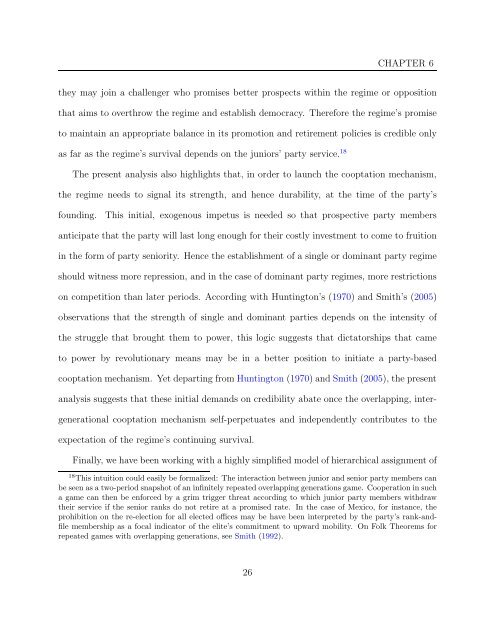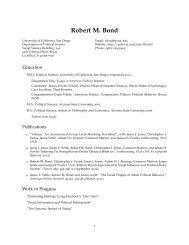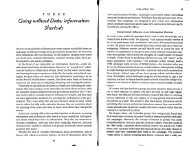Chapter 6 Why Authoritarian Parties? The Regime Party as an ...
Chapter 6 Why Authoritarian Parties? The Regime Party as an ...
Chapter 6 Why Authoritarian Parties? The Regime Party as an ...
You also want an ePaper? Increase the reach of your titles
YUMPU automatically turns print PDFs into web optimized ePapers that Google loves.
CHAPTER 6<br />
they may join a challenger who promises better prospects within the regime or opposition<br />
that aims to overthrow the regime <strong>an</strong>d establish democracy. <strong>The</strong>refore the regime’s promise<br />
to maintain <strong>an</strong> appropriate bal<strong>an</strong>ce in its promotion <strong>an</strong>d retirement policies is credible only<br />
<strong>as</strong> far <strong>as</strong> the regime’s survival depends on the juniors’ party service. 18<br />
<strong>The</strong> present <strong>an</strong>alysis also highlights that, in order to launch the cooptation mech<strong>an</strong>ism,<br />
the regime needs to signal its strength, <strong>an</strong>d hence durability, at the time of the party’s<br />
founding. This initial, exogenous impetus is needed so that prospective party members<br />
<strong>an</strong>ticipate that the party will l<strong>as</strong>t long enough for their costly investment to come to fruition<br />
in the form of party seniority. Hence the establishment of a single or domin<strong>an</strong>t party regime<br />
should witness more repression, <strong>an</strong>d in the c<strong>as</strong>e of domin<strong>an</strong>t party regimes, more restrictions<br />
on competition th<strong>an</strong> later periods. According with Huntington’s (1970) <strong>an</strong>d Smith’s (2005)<br />
observations that the strength of single <strong>an</strong>d domin<strong>an</strong>t parties depends on the intensity of<br />
the struggle that brought them to power, this logic suggests that dictatorships that came<br />
to power by revolutionary me<strong>an</strong>s may be in a better position to initiate a party-b<strong>as</strong>ed<br />
cooptationmech<strong>an</strong>ism. Yet departing fromHuntington (1970)<strong>an</strong>dSmith (2005), thepresent<br />
<strong>an</strong>alysis suggests that these initial dem<strong>an</strong>ds on credibility abate once the overlapping, inter-<br />
generational cooptation mech<strong>an</strong>ism self-perpetuates <strong>an</strong>d independently contributes to the<br />
expectation of the regime’s continuing survival.<br />
Finally, we havebeenworking withahighlysimplified modelofhierarchical <strong>as</strong>signment of<br />
18 This intuition could e<strong>as</strong>ily be formalized: <strong>The</strong> interaction between junior <strong>an</strong>d senior party members c<strong>an</strong><br />
be seen <strong>as</strong> a two-periodsnapshotof <strong>an</strong> infinitely repeated overlappinggenerationsgame. Cooperationin such<br />
a game c<strong>an</strong> then be enforced by a grim trigger threat according to which junior party members withdraw<br />
their service if the senior r<strong>an</strong>ks do not retire at a promised rate. In the c<strong>as</strong>e of Mexico, for inst<strong>an</strong>ce, the<br />
prohibition on the re-election for all elected offices may be have been interpreted by the party’s r<strong>an</strong>k-<strong>an</strong>dfile<br />
membership <strong>as</strong> a focal indicator of the elite’s commitment to upward mobility. On Folk <strong>The</strong>orems for<br />
repeated games with overlapping generations, see Smith (1992).<br />
26











